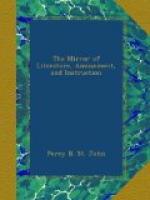This was no praise of party: contemporary criticism universally allowed Anastasius to be a work in which great and extraordinary talent is evinced. It abounds in sublime passages—in sense—in knowledge of history, and in knowledge of human character;—and the rapid sale of three editions has proved these superior characteristics to have been amply recognised by the reading public. The work in its fourth edition still enjoys a good sale. In each reprint the nicety of the writer is traceable: the corrections and alterations in the metaphysical portions on such passages as illustrate points of character, are elaborated with exquisite skill, and fresh turns of scholarly elegance are observable throughout each volume of the work. Memory has probably in some instances enabled the author to re-touch his pictures of Eastern scenery, and rearrange his grouping of particular incidents. What a delightful labour of leisure must this have been for so ingenious a mind! One of his similes—a weeping lady’s eyes compared to violets steeped in dew—has never been out of our recollection; and one of his battle scenes almost makes the reader imagine himself transfixed to the spot by a weapon of the contest.
Mr. Hope married, in 1806, the Hon. Louisa Beresford, daughter of the late Lord Decies, Archbishop of Tuam, and sister of the present peer, by whom he has left three sons, the eldest of whom, Mr. Henry Hope, was groom of the bedchamber to the late king, and recently took his seat in parliament for the borough of West Looe. Of their highly-gifted and accomplished mother we know many amiable traits; and, however bright may have been her fashionable splendour in high life, it is more than counterbalanced by her active benevolence in the county, in visiting the homes and relieving the distresses of the poor of the neighbourhood.




